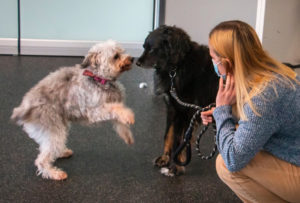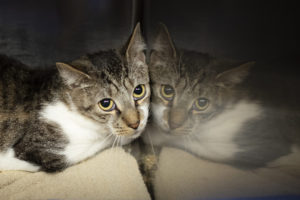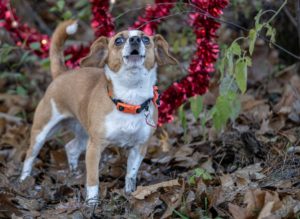Furry companions became a lifeline for many people during the pandemic as an estimated 23 million American households adopted a pet. At the same time, however, housing issues and loss of income made life more stressful for some pet owners.
Grants from Maine Community Foundation’s Animal Welfare Fund helped close gaps in services with support for veterinary services, vaccination clinics, food, spay and neuter assistance, and stay-at-home programs. MaineCF has awarded more than $1 million in grants since the program began in 2008. Read some of our grantees' stories, below.
Visit our website to learn more about changes to the grant program this year. You can register for an informational session on Zoom, Thursday, April 28, from noon to 1 p.m. The deadline for 2022 proposals is June 1.

Bree reunites with her brother Burt and owner after a month in foster care.
Kennebunk: A safety net for Bree
Life was good for Bree, a fluffy pooch adopted about five years ago from the Animal Welfare Society in Kennebunk – at least until her owner had to move from seasonal to year-round housing and needed help with the dog's care.
That’s when AWS stepped in with its Stay@Home program for qualified community members who need temporary support to care for their pets. The program, funded by a MaineCF grant, keeps pets in their homes with their families by providing training resources, food, veterinary services, temporary boarding, and other assistance. It also aims to reduce local animal shelter admissions, so kennels remain available for truly homeless pets from Maine and other parts of the country.
Bree’s story had a happy ending after an AWS volunteer came to the rescue with a short-term foster home. Just a month later, Bree’s owner secured housing and Bree was reunited with her in time to enjoy the holiday season together in their new warm home.

Baby awaits adoption at Responsible Pet Care of Oxford Hills. Jill Piper photo
Oxford Hills: Quality of life for pets and owners
MaineCF funding to Responsible Pet Care of Oxford Hills (RPC) made a big difference during the pandemic for this nonprofit that serves rural, western Maine.
“Having the ability to offer grants to help offset the cost of spay/neuter is huge and we also put folks in touch with lower-cost veterinary service options that further assist them financially,’ said Shirley Boyce, its president. “Since low-cost service options are slim to none in our area, and low-income and elderly pet owners can't drive distances, we have done shuttles that take groups of pets to those low-cost locations.”
RPC saw an uptick of pet owners who needed to surrender their pets during the pandemic, primarily due to housing issues in this low-income region. “We commit to do as much as we can to keep pets in the home, which most times assistance with pet nutrition and spay/neuter can solve,” Boyce said.

Delilah, a Parson Russell Terrier mix, has been with the Bangor Humane Society for nearly three years and is still searching for the right home for her unique needs.
Bangor: A trusted resource during a trying time
Throughout the pandemic, Bangor Humane Society gave pets a second chance at their best life with new homes for more than 1,800 animals in 2021. The nonprofit organization worked with rescues from southern states like Georgia and Florida to transport nearly 500 animals to Maine.
“Though there were many challenges we faced during the pandemic, interest in adopting furry family members never seemed to wane in our communities,” said Kathryn Ravenscraft, director of development.
MaineCF grant funding contributed to more than $46,000 in spay/neuter vouchers through Bangor Humane Society, alleviating a little financial stress for hundreds of families and individuals.
For more information about the Animal Welfare Fund, please contact Program Officer John Ochira, jochira@mainecf.org or 207-412-0837.





